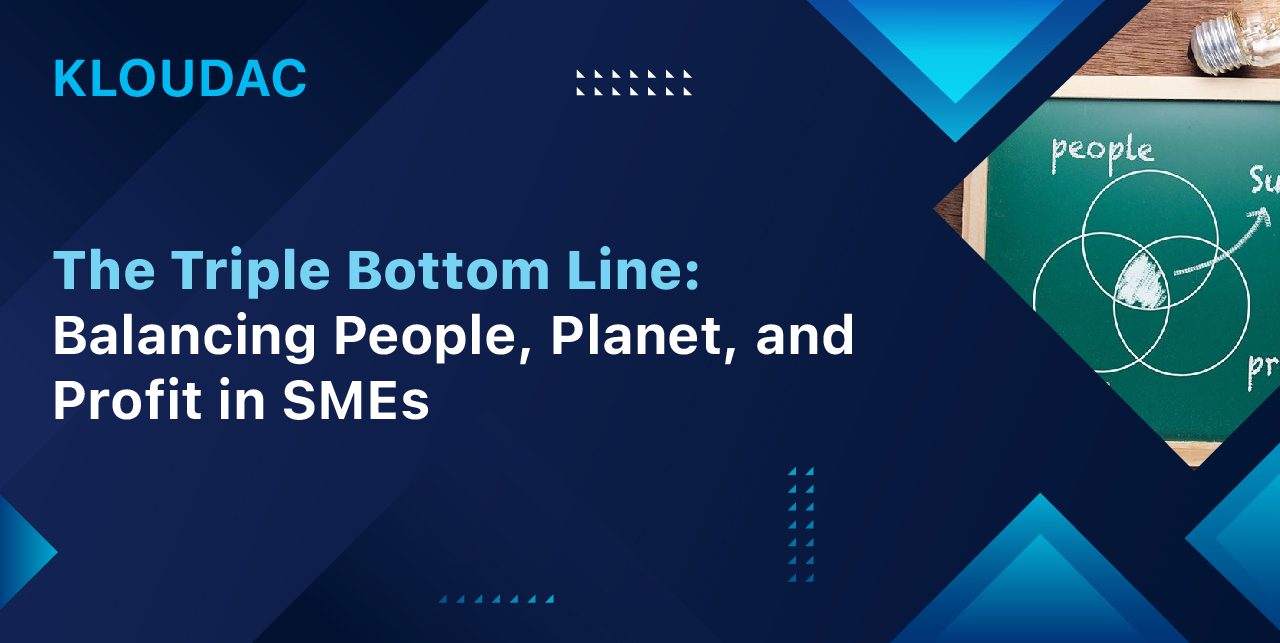In an era where sustainability and social responsibility are gaining increasing importance, small and medium-sized enterprises (SMEs) are recognizing the need to move beyond mere profit maximization. The concept of the Triple Bottom Line (TBL) has emerged as a guiding principle, encouraging businesses to consider not only their financial performance but also their impact on people and the planet. In this blog post, we explore how SMEs can effectively balance people, planet, and profit to create a sustainable and responsible business model.
The Triple Bottom Line, coined by John Elkington in the late 1990s, expands the traditional business focus on financial outcomes by introducing two additional dimensions: social and environmental. The TBL framework encourages businesses to evaluate their success based on three interconnected pillars—people, planet, and profit. Let’s delve into each aspect to understand how SMEs can integrate them into their operations.
1. People: Fostering Social Responsibility
For SMEs, placing people at the forefront means considering the welfare of employees, customers, and the communities they operate in. This involves fair labor practices, employee well-being, and active community engagement. SMEs can achieve this by:
a. Employee Well-being
Investing in employee development, providing a safe and inclusive work environment, and offering competitive wages are key components. A happy and engaged workforce is more likely to contribute positively to the overall success of the business.
b. Community Engagement
SMEs can build strong ties with local communities through initiatives such as supporting local charities, participating in community events, or sourcing goods and services locally. This not only enhances the company’s reputation but also fosters a sense of social responsibility.
2. Planet: Embracing Environmental Sustainability
Environmental responsibility is crucial for SMEs aiming to minimize their ecological footprint. Integrating sustainable practices into business operations can have a positive impact on the planet. Here’s how:
a. Green Practices
Implementing energy-efficient measures, reducing waste, and adopting sustainable sourcing practices are steps SMEs can take to minimize their environmental impact. This not only helps the planet but can also lead to cost savings in the long run.
b. Carbon Footprint Reduction
SMEs can explore ways to reduce their carbon footprint by using renewable energy sources, optimizing transportation and logistics, and adopting eco-friendly technologies. Communicating these efforts to customers can enhance the company’s eco-friendly image.
3. Profit: Ensuring Financial Viability
While social and environmental considerations are integral, the financial aspect remains crucial for the sustainability of SMEs. Profitability allows businesses to invest in people and planet initiatives. Strategies for achieving financial viability include:
a. Sustainable Business Models
Incorporating sustainable practices into the core business model can attract environmentally conscious consumers and investors. This may include offering eco-friendly products or services or adopting circular economy principles.
b. Long-term Planning
SMEs should prioritize long-term planning over short-term gains. This involves strategic financial management, including budgeting for sustainability initiatives and investing in technologies that promote both profitability and environmental responsibility.
Challenges and Opportunities
While embracing the Triple Bottom Line brings numerous benefits, SMEs may encounter challenges in terms of initial investment, market competition, and regulatory compliance. However, these challenges also present opportunities for innovation, cost savings, and differentiation in the market.
KLOUDAC Accounting Firm Dubai, UAE
The Triple Bottom Line offers SMEs a holistic approach to business success—one that goes beyond profit margins to consider the well-being of people and the health of the planet. KLOUDAC helps by striking a balance between people, planet, and profit, SMEs position themselves as responsible and sustainable contributors to a better future. As consumer preferences continue to shift towards socially and environmentally conscious choices, embracing the TBL is not just a moral imperative but also a strategic business decision for the long-term success of SMEs.
